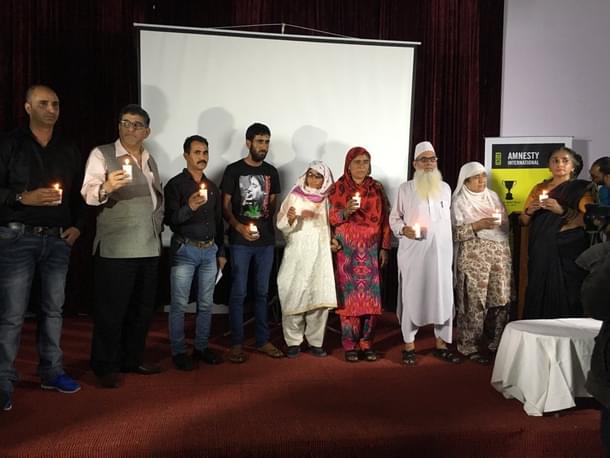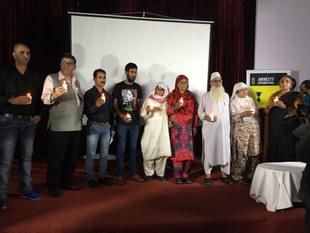Politics
Amnesty’s One-Eyed Approach To Human Rights Abuses Is Seriously Flawed
R Jagannathan
Aug 17, 2016, 01:54 PM | Updated 01:54 PM IST
Save & read from anywhere!
Bookmark stories for easy access on any device or the Swarajya app.


The Karnataka government’s efforts
to slap a charge of “sedition” against Amnesty India for holding an event in
Bengaluru, where it sought to highlight the human rights violations in Jammu
& Kashmir, are nonsensical. The mere fact that some pro-azaadi slogans were
shouted does not make Amnesty’s own efforts seditious. The sedition law has to
be invoked rarely, and only when organisations try to overawe the state and
attempt to overthrow it by force, or incite people to violence. Free speech, even
when intemperate words are used, cannot be labelled as sedition.
However, Amnesty deserves a closer scrutiny, and its biases labelled for what they are. NGO Monitor, which has scrutinised Amnesty’s operations closely and come out with a critical report, notes that the “halo effect” shields “groups claiming to promote universal moral agendas and human rights from scrutiny because of a perceived impartiality.”
The first thing wrong with Amnesty, whether in India or abroad, is its assumption that human rights violations are only about unlawful state violence, and not violence against the state and ordinary citizens by non-state actors. It has to balance its critiques of state violence and lack of respect for human rights with strong criticism of similar acts by non-state actors.
The presumption that states have to be held to higher standards of behaviour is fine, but is no longer overwhelmingly realistic. The rapid spread of killing technologies and communications has changed the power balance between state and non-state actors, as 9/11, 26/11, and the wanton killings of masses of people in Paris and elsewhere by lethally armed gunmen have proved. Non-state violations of human rights are now far greater than state violations, especially in established democracies. When a state has to fight terror with its hands tied to the law, the least one can do is call out the forces ranged against it.
It makes no sense for Amnesty or any human rights organisation to refuse to note this change. It has to give prominence to human rights abuses by violent groups and/or violent individuals. You may not be able to do much about them, but by highlighting one set of abuses and refusing to see the other, Amnesty effectively legitimises violations by non-state actors. This is true in Kashmir. It is fair to question the use of pellet guns against mobs, but it is equally important to call out mob violence against state security forces, where despite restraint, the police have faced huge injuries from stone-pelting.
When police stations are consistently targeted, one can’t just call these random acts of inflamed mobs. Violence has been a two-way affair in J&K. In 2016 so far, anti-terrorist operations have claimed the lives of one civilian, 22 security personnel, and 53 terrorists, according to the South Asia Terrorism Portal. (This figure excludes the deaths in police firing in mobs after the killing of Burhan Wani. The point is that the state is under attack too, and has a right to defend itself).
The second point is that organisations like Amnesty, thanks to years of trying to defend citizens against the state, have now come to empathise with the undeserving. It is clear that Amnesty has gotten into bed with Islamists, who promote jihadi ideologies either directly or covertly. Six years ago, Amnesty sacked Gita Sahgal, head of its gender unit, for questioning Amnesty’s support for Moazzam Begg, a former Guantanamo prisoner, who is linked to an organisation called Cage, which supports jihadism for “self-defence”.
A Sunday Times story on Sahgal some years ago quoted her as saying
that Amnesty puts the rights of terror suspects above those of terror’s victims
for fear of being branded Islamophobic. She alleged that Begg was “Britain’s
most famous supporter of the Taliban”, having fought for the rights of “jailed
Al Qaeda members and hate preachers, including Anwar Al Awlaki, the alleged
spiritual mentor of the Christmas Day Detroit plane bomber.” Al Awlaki was killed
on US President Barack Obama’s orders through a drone attack, the first such
assassination of an American citizen linked to terrorists.
In a statement made after her separation from Amnesty, Sahgal said:
“The senior leadership of Amnesty International chose to answer the questions I posed about Amnesty International’s relationship with Moazzam Begg by affirming their links with him. Now they have also confirmed that the views of Begg, his associates, and his organisation, Cageprisoners, do not trouble them. They have stated that the idea of jihad in self-defence is not antithetical to human rights; and have explained that they meant only the specific form of violent jihad that Moazzam Begg and others in Cageprisoners assert is the individual obligation of every Muslim.”
When so-called human rights organisation declare some forms of jihad kosher, how can they claim to be impartial while flagging rights violations?
Another critical report on Amnesty comes from NGO Monitor, a group of researchers formed in 2002 to scrutinise NGOs and their predilections. Its conclusion: Amnesty uses bad methodology (to come to its conclusions), is corrupt and has an anti-Israel bias. Among its major conclusions (read the full report here) were the following:
- Some of Amnesty’s own professional staff believe that Amnesty is undermining human rights through its own
policies and practices.
- Repeated examples of “lawfare,” where the organisation uses tendentious
misapplication of legal terms and statutes to create the false impression of
guilt.
- Systematic flaws in the reporting of human rights abuses,
including the repetition of false libel and comparison of Israel to terror
groups such as Hamas. (This happens in
India too, where actions of state agencies are unfairly compared with those of
terror groups – Author).
- An inadequate understanding of armed conflict leading to erroneous
claims and incorrect analysis.
- Violation of the universality of human rights, including a
consistent institutionalised bias against Israel through double standards.
- The employment of individuals in key research and leadership
positions whose backgrounds, skills, and activities demonstrate the absence of
professional human rights experience, exacerbated by deep ideological and
political bias. This trend is incompatible with the requirements for credible
and universal human rights reporting and analysis.
NGO Monitor’s observations are particularly relevant to Amnesty India’s approach to human rights violations in the country, uninformed as it is about the gap between theory and ground reality.
It goes without saying that states must follow the rule of law when dealing with those who indulge in crimes. Human rights violations are said to occur when the state or its agents use extra-legal means or powerful laws to deal with high impact crime, including terrorism. This is obviously right, but the observation needs to be nuanced. There are states and states. There are states where the rule of law is already strong (most of Europe and the US), and where it is still to be established firmly (as in India, and much of the third world).
In India, we do have a constitution that lays out the basis for the rule of law, but it can be no one’s case that we actually follow it in spirit when trying to enforce it. We have a weak state with poor law enforcement capabilities, which is weakened further by a first-past-the-post electoral system where three or four community groups can band together and grab power, especially in states. The implementation of the law thus is biased towards some groups and communities and against some others. This is why even convicted criminals are considered heroes in their own communities (eg, Lalu Prasad, Afzal Guru).
Maintenance of any kind of public order in India requires draconian laws, since the state machinery is unable to deal with public expectations without these powers. Whether it is the Unlawful Activities Prevention Act, or laws to prevent atrocities against women or Dalits, or the Armed Forces (Special Powers) Act, these are draconian legislations that reduce the burden of evidence required to enforce the law. In other words, they are inherently flawed and prone to state misuse. These laws exist and still command popular support precisely because they are draconian and enable some action against offenders that would not have been possible using normal laws. Public expectations from the law outrun the state’s capacities to apply the law fairly. This is at the root of whatever violations happen in the area of human rights.
This is what needs fixing, and is a work-in-progress, with the courts forcing change in some areas, and NGOs in some others.
Terrorism, in particular, has forced not only India, but even the west, to legislate stronger laws that would earlier have been considered extremely violative of human rights. The US President can order drone attacks and assassinations of terrorists without being subjected to domestic or international scrutiny on its decisions. US spy agencies routinely monitor mail and social media, thus invading the privacy of millions of citizens and non-citizens who may have nothing remotely to do with terror. Europe is less casual about these violations, but will surely start legislating tougher laws now that it is directly under attack by jihadis.
What one is getting at is this: the rule of law is defined differently at different times based on the kind of challenges faced by the state and its hold on the monopoly of violence. When existing laws fail, stronger ones are legislated. What is or is not a human rights violation has to be judged against the context in which draconian laws are legislated.
The fundamental thing that underpins state authority is its ability to monopolise violence; it is only when this monopoly is real that you can hold it fully accountable for occasional violations of human rights. But this is not the case in India.
No state in history has established the rule of law without first eliminating rival claimants to power through violence. Many of the human rights abuses happening now emanate from the fact that the Indian state is still to establish a complete monopoly of violence.
This does not mean we have to applaud human rights abuses by the Indian state; but it does mean that organisations like Amnesty need to challenge their theories and strike a balance between forces that threaten the state, and the state which threatens it citizens.
The simple truths Amnesty needs to understand are:
- A state has a right to defend
itself against those who seek to challenge its monopoly of violence.
- A non-state actor’s violations
of human rights need to be noted and excoriated, especially when these
non-state actors have the support of actual states. Pakistan’s role in stirring
up jihadism in J&K is a case in point.
- Amnesty itself needs to cleanse
itself of its biases. It has to decide whether it is a genuine human rights
organisation that is blind to the colour or source of this abuse, or has
ideological blinkers. If it is the latter, it has no right to be in business.
- A strong state is a
prerequisite for the elimination of human rights violations.
Photo Credit: Amnesty International India Twitter Handle
Jagannathan is former Editorial Director, Swarajya. He tweets at @TheJaggi.





